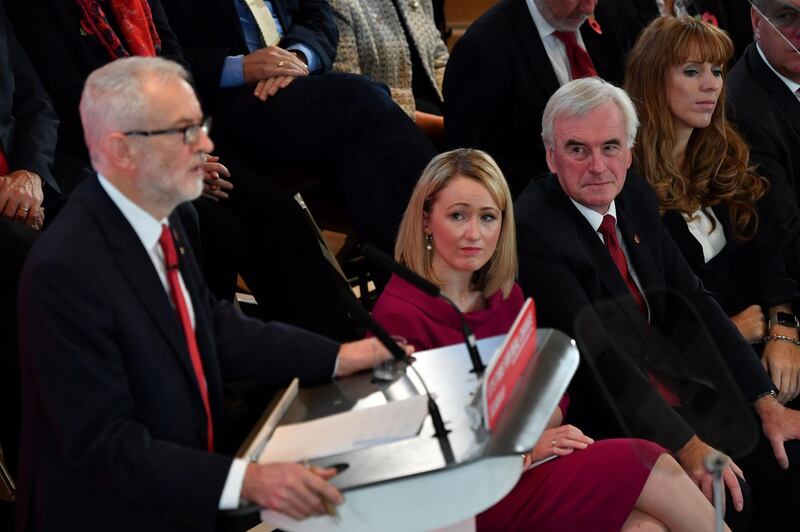The defining crisis of the modern era was the 2008 financial crash, yet the global economy has not fundamentally changed character in response. Curiously, the impact of the crisis has been much greater on global politics than on the economic system. The rise of populism has reshaped diplomatic rules and triggered political tensions but not significantly altered how business is done.
Next month's general election in Britain could be a defining moment. Radical left-wingers see an opportunity to pioneer an alternative economic programme to deconstruct modern-day capitalism. Taking control of the world's fifth-largest economy would initiate a new phase of the fallout from 2008.
The election was supposed to be an unofficial vote on Brexit as the government sought a new mandate to resolve the three-year standoff over leaving the EU. However, elections have a way of choosing their own themes. The Labour party has set out its ideas of a people-versus-elite contest from the very first moment of the campaign.
Mike Ashley, the retail tycoon and owner of struggling Newcastle United football club, was among a handful of pantomime villains criticised last week by the opposition leader Jeremy Corbyn, who declared his government would "go after" the monied elite if it came to power in next month's election.
While Mr Ashley retorted that the opposition leader was a "clueless" wrecker, the speech gave Labour the lift-off craved by the faithful.
The opening salvo of the Labour campaign raised the question of just how radical the Marxist Labour leader would be with the chance to lead Britain.
The answer is that Mr Corbyn and his prime political henchman, John McDonnell, are revolutionary figures. It is a grave error to assume they cannot or will not take the opportunity to carry out sweeping change.
According to their agenda, they would sweep away the concept of private ownership and seek to mobilise private resources on behalf of the government. The system of market-led demand would be replaced with an anti-capitalist alternative.
Mr McDonnell in particular has been passionate about the destruction of capitalism since he entered politics in the 1970s.
The grey-haired grandfatherly figure, who appears at staff dinners in a V-necked jumper, does not come across as much of a threat. Yet the would-be chancellor is rumoured to be designing his own model of a reshaped British economy on a computer in his home.
Despite his long-held views, there is widespread complacency about Labour gaining power.
This is in part because the Conservatives are promoting a hard Brexit that has turned the pound into a grand version of an emerging market currency. The Conservatives' Brexit would reduce the economy by six per cent over a decade.
No wonder the Citibank UK economist Christian Schulz declared a "Corbyn run" on the pound as old hat earlier this year. "Is Corbyn as bad as no-deal? Perhaps no longer," he told one newspaper.
The first phase of the policy dubbed "McDonnellomics" would include nationalising British utility companies and forcing the biggest UK-registered companies to pay dividends to their employees on 10 per cent of company stock. A list of 23 companies that pay £5 billion (Dh23.74bn) in dividends has already been drawn up.
Mr McDonnell also wants to give renters the right to buy their homes. For the left, this idea is prized as an inversion of former Tory prime minister Margaret Thatcher's scheme for tenants to buy state-owned properties.
The real opportunity for Mr McDonnell and Mr Corbyn is the long-term goal of what is called the democratic economy.
This would mean taking control of the banking system, including the Bank of England, to fund the state's investment plans in infrastructure and lending to business.
The economists known to influence the Labour leadership ultimately wish to introduce the ideal of pre-distribution into the financial model: that is, that decision-makers in committees would decide on sharing the spoils before investment and purchasing decisions. The market would not allocate but collective choices would reign supreme.
British Prime Minister Boris Johnson is putting up a fight, having shifted the Conservatives to much more free-spending policies. In his newspaper columns, Mr Johnson has shown his interest in activist economic approaches. Since taking office he has pledged an extra £1.8bn (Dh8.55bn) of state money towards the National Health Service and promised to upgrade 20 hospitals. He has pivoted party policies to back the revival of neglected areas such as the north of England. He has also championed spending on broadband and communications infrastructure, another great source of grievance.
Labour has cleaved a much deeper dividing line between those who live off wealth and those who survive by working. It is a message especially popular among the young.
Statistics show that people born in the 1980s have grown up to become the first generation that will not be richer than their parents by the time they reach 40.
The history of recent years is that no idea can be dismissed out of hand as too audacious or unworkable.
Damien McElroy is London bureau chief for The National





